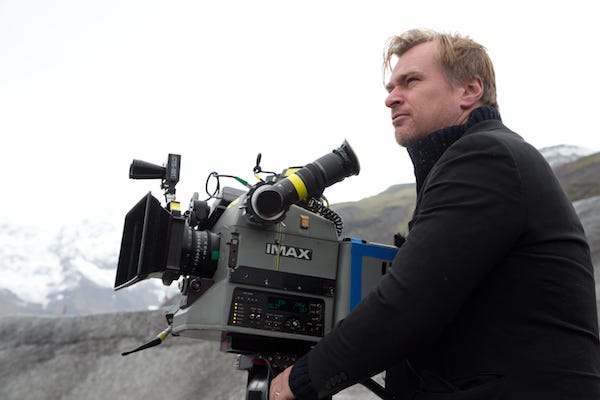'Tenet' Review
Christopher Nolan's Tenet is a big, bold, time-twisting blockbuster. See it in IMAX if you can.
Christopher Nolan is fascinated by the ways in which time can be used to tell a story, to rejigger narrative, to help us understand ourselves. In a story, time is a tool like any other, a resource to heighten drama and obscure facts to manufacture surprise, all while exploring questions of identity and how we become the people we are. Eventually in Nolan’s narratives time inevitably folds in on itself, collapsing, bringing the story to a single point in . . . time.
Consider Memento. Nolan, adapting a short story by his brother, Jonathan, tells a bipartite story—one strand following Leonard (Guy Pearce) in living color as we travel backwards in time to learn why he has killed Teddy (Joe Pantoliano) in the basement of an abandoned building; the other in black and white as Leonard explains to an unseen antagonist on the phone his “condition” (a form of amnesia that precludes the formation of new memories)—in an attempt to answer a quandary Leonard poses in the film’s final moments: “I have to believe that my actions still have meaning, even if I can't remember them. I have to believe that when my eyes are closed, the world’s still there.”
Are we defined by our actions or how we think of ourselves? How better to answer that question than by experiencing the world as Leonard does, mucking about with editing and structure and color to allow us to experience the world as he does? By restructuring a noir to show us the world through the eyes of a man with no immediate past and a distant memory revealed to be, ultimately, untrustworthy, we realize the question is even thornier and more complicated than it sounds.
Nolan’s Inception and Dunkirk play with our conception of time as constant. The dream-within-a-dream conceit of Inception and the one week/one day/one hour structure of Dunkirk are not dissimilar, especially given the way that Nolan ends up collapsing these time frames in on each other—literally in the case of Inception, with its perpetually falling van, exploding elevator shaft, and collapsing snow base operating simultaneous levels of the dream; impressionistically in Dunkirk, with the one week on the beach serving as a sort of limbo or purgatory, a realm from which there is no escape. Men stripped of hope stare with dead eyes out into an endless expanse of water, foam flecking up on the beach, awaiting salvation in the form of a ship and a plane that are coming at some point in the future while we watch them languish in the present.
Nolan literalizes the concept of time as a three-dimensional space in Interstellar, a movie about relativity and time slippage and the horror of losing your family due to the vagaries of time. Time, time, time: It’s everywhere in Interstellar, a movie less about movement through space than movement through moments. Nolan literally moves epochs around in a very real sense in this movie, using footage from a Ken Burns documentary about a Dust Bowl past to suggest one possible, blighted future. And that future itself slips and slides in fits and starts, ultimately doubling back to one collapsed NOW—the tesseract, the eternal library, the moment where Cooper (Matthew McConaughey) decides to leave Murph (Mackenzie Foy) and also where he tells Murph (Jessica Chastain) how to save humanity.
As one character in Interstellar puts it, “Time is relative, okay? It can stretch and it can squeeze, but—it can’t run backwards. It just can’t.” What Tenet presupposes is: Maybe it can?

Tenet is the culmination of Christopher Nolan’s fascination with time, an audacious and gaudy effort to make it run backwards and forwards simultaneously on the biggest screen possible with the loudest speakers imaginable. It’s aggressively complicated, from the basic plot to the science underpinning what we see on screen to the logical paradoxes that threaten to pull the rug out from underneath the movie at every point. Indeed, one character wearing a shiny white lab coat trying to explain “inversion”—the process by which our characters can manipulate objects and make them reverse their entropy, thus seeming to move backward through time—suggests that the nameless Protagonist (John David Washington), and by extension the viewer, not think too hard about it. Just let it flow over you. Just feel it. Just go with the flow . . . of time.
Occasionally Nolan’s ambition may have gotten the better of him here. Particularly in the film’s final set piece, where a combination of “inversion,” mask-wearing, and questionable sound-mixing renders the action onscreen almost indecipherable. You can feel him trying to do something we’ve never seen before; the action in this portion of the film is aggressively new, tinkering with our perceptions and forcing our brain to try to process the cinematic splendor before us in a radically nonlinear way. Seeing two characters attack the same building at the same instant while moving through different, well, streams of time, I guess, is mind-bending. It is a pure and literal manifestation of Nolan’s obsession with chronology, a use of the tools and tricks of cinema to show time flowing in both directions at once.
I’ll be honest: I’m not entirely sure it works.
And yet, there was something so wondrous about seeing a big-ass movie on a big-ass screen directed by a guy who simply knows how to make a big action set piece sing. I was literally just sitting in the IMAX auditorium with a big grin on my (masked) face during the opening assault on an opera house in Russia as Protagonist’s CIA team sweeps in to exfil an undercover agent who has been made by the bad guys. The tracking shots, the swooping cameras, the movement, the compact hand-to-hand action, the big explosions: It was just glorious to get to watch something awesome and audacious on a 50-foot screen after watching six months of The Old Guard and Extraction and Greyhound—fine films all, but films that absolutely could have doubled as mid-budget BBC series without anyone really noticing—on a 60-inch plasma.
Tenet’s complications are smoothed by Nolan’s wry sense of humor. There’s a knock on Nolan that his movies are bereft of humor, that they’re too dark and dour. I don’t know where this comes from, but it’s nonsense: from the robots TARS and CASE in Interstellar to the gags in the Batman movies about hockey pants and the rich going broke differently and “death by exile” all the way back to the bit in Memento where the hotel clerk has rented Leonard two different rooms in order to earn a few extra bucks, there’s a very dry, very British sense of humor underpinning his work.
And Tenet is no exception. The bit in the trailers about crashing an airplane into a building—“Don’t be so dramatic,” Neil (Robert Pattinson) says, when Protagonist balks—is an obvious point of comedy. But there’s more elsewhere; pretty much the whole five-minute stretch of the movie where Protagonist meets with Sir Michael Crosby (Michael Caine) in a yacht club is class-as-comedy gold. It helps that Washington has excellent comic timing; without spoiling the punchline, a suggested vacation destination for Kat (Elizabeth Debicki) and her billionaire arms-dealing husband Sator (Kenneth Branagh) is literally laugh-out-loud funny.
Tenet is ambitious and messy and big and bold. Nolan’s reach might have occasionally exceeded his grasp, but what a joy to see him reach. It’s a movie worth seeing in theaters on as large a screen as possible.

This isn’t a ranking of Christopher Nolan movies, exactly. At least not by quality. It’s a ranking of Christopher Nolan movies you should watch ahead of this movie in particular, a suggested syllabus if you want a primer on the films that best reflect the concerns of Tenet. His movies from least- to most-interested in time. (If I could find the movie streaming for free, I included a link to the service it’s streaming on; otherwise, I went with VOD.)
10. Insomnia (HBO Max) 9. The Dark Knight Rises (VOD) 8. The Dark Knight (VOD) 7. Batman Begins (HBO Max) 6. Following (The Criterion Channel) 5. The Prestige (VOD) 4. Dunkirk (VOD) 3. Inception (Prime) 2. Memento (Kanopy) 1. Interstellar (FX Now)





